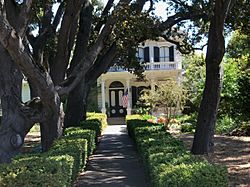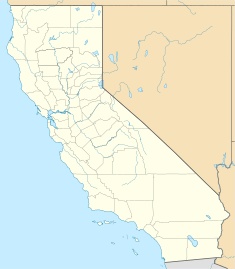Godfrey M. Bockius House facts for kids
Quick facts for kids |
|
|
Bockius, Godfrey M., House
|
|
 |
|
| Location | 322 E. Beach St., Watsonville, California |
|---|---|
| Area | 1 acre (0.40 ha) |
| Built | 1870 |
| Architect | Alex Chalmers |
| Architectural style | Italianate—Victorian |
| NRHP reference No. | 89000937 |
| Added to NRHP | July 13, 1989 |
The Godfrey M. Bockius House is a beautiful old house in Watsonville, California. It's also known as the Bockius - Orr House by people who live nearby. This house was built way back in 1870 and has a special style called Italianate—Victorian. It was first built for Judge Godfrey M. Bockius. Later, a family member named Frank F. Orr lived there.
Today, this historic house is the main office for the Pajaro Valley Historical Association. It's also listed on the National Register of Historic Places, which means it's a very important historical building. The area around the house also includes the Volck Museum and the Alzora Snyder Archive, which hold many interesting historical items.
Contents
Who Was Godfrey M. Bockius?
Godfrey M. Bockius was an important person in the early days of Watsonville, California. He helped develop farming in the Pajaro Valley. He also played a big role in the city government and businesses in Watsonville.
Judge and City Leader
From 1858 to 1862, Judge Bockius served as a judge in Santa Cruz County, California. In 1868, Watsonville officially became a city. Judge Bockius was chosen to lead the first Board of Trustees for the city. In 1871, he was elected to the California State Assembly. This meant he helped make laws for the entire state.
Who Was Frank F. Orr?
Frank F. Orr was the last person from the Bockius family to live in the house. He was the editor of the Register Pajaronian newspaper. This newspaper won a special award called the Pulitzer Prize in 1956. They won it for their investigative reporting, which means they looked deeply into important issues to help the public.
A Photographer in World War II
Frank Orr also served in the US Army during World War II. He was a captain and was in charge of taking still pictures for the Army Signal Corps. The Alzora Snyder Archive has many photos from his collection. These pictures were once secret but now help us understand history better.


